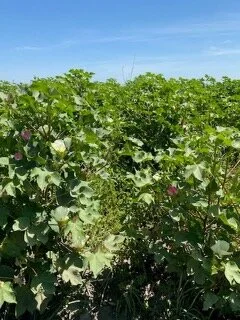Alongside Rebecca Burgess of Fibershed, Lauren Tucker of White Buffalo Land Trust, and Lauren Bright of Torus Consulting, Krystle Moody Wood co-founded the California Cotton and Climate Coalition in 2020.
Check out the C4 website for the most current and up-to-date information on the organization https://californiacottonandclimatecoalition.com/.
You can find more about the role Krystle played alongside a deeply committed community since the organization’s founding in October 2020. As of 2023, Rebecca Burgess, Lauren Tucker and Lauren Bright are actively serving members with Krystle working with the organization “on call” and as needed.
Krystle is very grateful for this continued work with Rebecca Burgess of Fibershed in Climate Beneficial (TM) Fiber Systems (e.g. first wool and now cotton) and credits Rebecca and her organization for the incredible groundwork they have already done and are still doing to educate and empower this approach to developing textiles. We, at Materevolve, consider Fibershed important allies and partners and look forward to continuing to support C4 both inside and alongside the organization.
Soil sample from cotton field post-harvesting (left), healthy soil sample (right).
The California Cotton & Climate Coalition, known as C4, aims to build capacity within all stakeholders to grow, source, and develop climate beneficial, farm-forward textiles and supply chains in the future without the help of the coalition. C4 is led by Fibershed in partnership with White Buffalo Land Trust, Torus, Materevolve, Chico State University, Agri Technovation, Carbon Cycle Institute, Bowles Farming Company and Stone Land Company.
C4 is a coalition working together to evolve California cotton growing. This work can create a roadmap for all California cotton growers.
Together, we are supporting Climate Beneficial(TM) cotton. Climate Beneficial cotton improves soil health and water holding capacity, building and measuring soil carbon, and reducing the use of synthetic chemistry.
Food crops are rotated with cotton that include corn, wheat, garlic, onions and tomatoes. These transitions that we are making to cotton systems simultaneously affect food growing as well.
Dr. Cindy Daly of CRARS presenting on key learnings from Year One research plot at July 2021 Farm Tour. (photo credit: Torus Consulting)
C4 is a coalition of companies who currently sell cotton goods and are working pre-competitively from farm to fabric (or soil to skin), to invest in learning how to grow Climate Beneficial(TM) cotton in the unique Californian bioregion. This group was founded on the premise of working together, pre-competitively, to create a structure for investing in regionally grown, Climate Beneficial(TM) cotton that catalyzes critically important shifts in land stewardship and prioritizes working with domestic milling partners.
C4 is a relationship building project where farmers, merchant and gin operators, researchers, farm technical service advisors, nonprofit organizers, family foundation funders, brands, designers, textile developers, spinners, and textile mills are working together to bring a new agronomic and textile development system forward that is generating natural material goods for the marketplace. By working together, risk is shared by all partners, which is critical to implementing innovative practices on-farm, in the mill, and in the development of new goods. Brands that are sometimes competitors in the marketplace have come together with stakeholders to support soil health focused transitions in our food and cotton growing landscapes. Cotton supply stakeholders are normally not in communication as textile development traditionally happens, with brands purchasing fabric from a contract manufacturer who has purchased yarn from a spinner (another contract manufacturer) who has purchased cotton from a merchant. This allows for little-to-no transparency back to the farm. C4 is working in the opposite direction: farm-forward.
Through the coalition, brands are sourcing farm-forward from acreage that has been managed using conventional practices and chemical inputs which is now undergoing a transition to biological, soil building, and climate beneficial practices. Acreage involved in this project is managed by two farms: Bowles Farming Company in Los Banos, CA and Stone Land Company in Stratford, CA. Both sites are being monitored for a range of soil health indicators. Bowles Farming Company is collaborating on a site specific three year research trial with Chico State University’s Center for Regenerative Agriculture and Resilient Systems.
The project goals are to rebuild soil carbon stocks, increase the soil’s capacity to hold water, and significantly reduce synthetic inputs. The research and learnings from this project can create a roadmap for the additional 187,000 acres currently growing cotton in California.
Close up of cotton research plot July 2021 (photo credit: Torus Consulting)
Materevolve:
- co-led the textile development strategy and development of educational assets provided by California Cotton & Climate Coalition to textile brands, manufacturers and farmers as needed.
-provided technical textile expertise for domestic textile landscape to support cotton farmers integrating soil health practices
-spearheaded education programming and resources on cotton textile processing from soil to textile to build internal capacity at 10+ apparel, footwear and bedding brands
-worked to identify multiple textile development opportunities for coalition member brands to work pre-competitively on advancing California cotton systems including innovative region specific textile concepts
-gathered pricing and conducts technical assessment of key downstream textile and product manufacturing vendors for brand-specific farm to textile program targets
-supported experiential hands on learning activities, as well as programming content, at the farm level to educate on soil sampling, implementing regenerative agriculture practices, farm water use, social compliance, cotton processing, and more.
-showed consistent adaptability as needs of budding organization shift
First soil samples taken post harvest October 2020. We will use these to compare year over year direct measurements as more soil-enhancing practices are implemented. With these direct measurements, any changes in climate, practices, and farm strategy to improve soil health can be verified through tangible data.
Field side by side view of control sectors vs research sectors. (Photo credit: Torus Consulting)
Close up of pollinator strips for integrated pest management and reduction of pesticides. This is one of many soil-enhancing and biodiversity-enhancing practices implemented on the farms.






